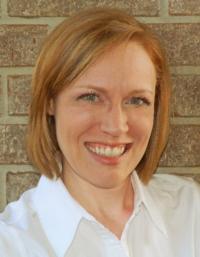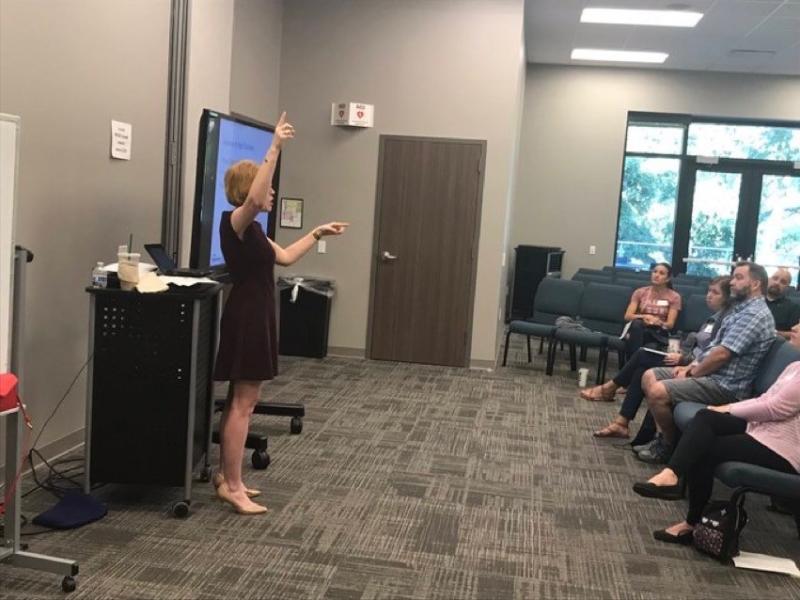Spotlight on Dietitian/Diabetes Educator, Kristen Constable

Kristen R. Constable, MS, RD, BC-ADM, CDE
Dietitian/Diabetes Educator
Wednesday, March 11th was National Registered Dietitian Nutritionist Day. JDRF Houston Gulf Coast Chapter has had the pleasure of partnering with many great volunteers in the medical field that not only help JDRF, but continue to give of their time, talents and recourses in our Type 1 diabetes (T1D) community. One such individual is Kristen. And in honor of that, our chapter would like to share her story.
Kristen has worked as a Registered Dietitian and Certified Diabetes Educator (CDE) for 14 years. She earned a Bachelor of Science degree in nutrition from Texas A&M University, followed by a Master of Science degree in nutrition from Texas Woman’s University. Kristen also holds a Board Certification in Advanced Diabetes Management (BC-ADM) and has the distinct honor as being one of only 600 in the country with this specialty designation. She is experienced in many different treatments for diabetes including diet, oral medications, insulin injections insulin pumps and CGM.
Kristen has partnered with JDRF at events like our TypeOneNation Summit and most recently our Nutrition Tips & Tricks.
A little background:
“In August 1997, my mother suspected something was amiss with my brother Bryan. He had mostly every symptom of T1D: increased thirst, frequent urination, weight loss, and fatigue. She brought him to the doctor and low and behold his blood sugar was over 400 mg/dL. He was sent to the hospital immediately and spent about a week receiving education (in those days, new onset patients were kept longer). My family is a very inclusive family; if one person had to follow a certain diet, we all did. I was 15 at the time and found carb counting and measuring food to be fascinating, especially when it came to how these things affected Bryan’s blood sugar. Eventually Bryan started on insulin pump therapy, which I was also very eager to learn about. By this point, I had seen the ups and downs of diabetes. I had learned how to treat both low and high blood sugar as well as what to do to prevent such scenarios. By the time I was 16, I knew that I needed to become a diabetes educator to help, support and empower a larger mass of people with this disease.”
What piece of advice would you like for your type 1 patients and/or patients in general to consider when partnering with a nutritionist/diabetes educator for their care?
“Dietitians and CDE’s are an integral part of T1D care. They work in conjunction with your physician to identify areas that may be causing a negative blood sugar reactions and provide ways to mitigate those issues. CDE’s are often insulin pump trainers as well. If you choose to use an insulin pump, the CDE will be the person adjusting your pump within physician specified guidelines. These healthcare professionals act as your everyday resource for questions and issues you may be having.
When partnering with a dietitian, it is important to tell your dietitian everything you consume, including herbs and supplements. If we don’t have this information, it can cause us to miss something extremely important. To give an example of this, I had an T1D patient who was having severe low blood sugars at night. It did not matter how much we reduced her insulin; she was still having lows. Finally, I asked if there was anything that she was taking, eating, or drinking at night that I was unaware. She admitted she was drinking a special Asian tea, but she didn’t think it was a big deal because she “did not put sugar in it”. Upon investigation, that particular tea blocks the liver’s ability to produce sugar resulting in a low blood sugar. After she discontinued the tea, her blood sugars normalized.
Just remember that your dietitian is there to help you see things you may be missing. The more information you can give the better; there is nothing insignificant.”
What would you like people to know about your field of expertise that’s not common knowledge?
“Most people don’t know how much education is required to become a dietitian/CDE. A dietitian must complete a 4-year nutrition degree program, followed by a 1 year internship. Beyond that, to become a diabetes educator, 1,000 practice hours must be completed before one can sit for the CDE exam. This process takes an additional 2-5 years.”
Any interesting tidbits you’d like to share or interesting experiences you’ve encountered while practicing?
“In 2003 I had the honor of being the first intern for the Texas A&M Athletic Department (Sports Nutrition). In that role, I was able to work with several T1D athletes, tailoring their meal plan and treatment plan for each individual sport. What’s interesting about diabetes educators is that we work with a myriad of different disciplines. We often work with school nurses, athletic trainers, coaches and teachers.”
“Diabetes is an art and a science.”
Written by Amanda Nguyen

